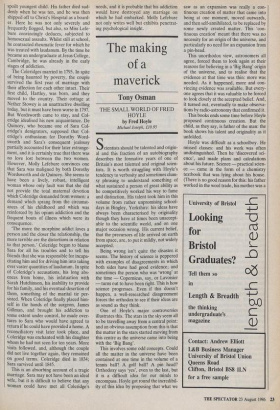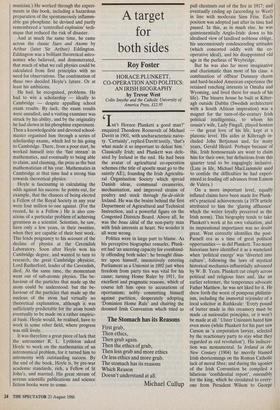The making of a maverick
Tony Osman
THE SMALL WORLD OF FRED HOYLE by Fred Hoyle
Michael Joseph, £10.95
Scientists should be talented and origin- al and this fraction of an autobiography describes the formative years of one of Britain's most talented and original scien- tists. It is worth struggling with Hoyle's tendency to verbosity and sometimes clum- sy phrasing to understand something of what sustained a person of great ability as he competitively worked his way to fame and distinction. His talent took him in this volume from rather unpromising school- days in Bingley, Yorkshire: his ideas have always been characterised by originality though they have at times been unaccept- able to the scientific world, and on one major occasion wrong. His current belief, that the precursors of life arrived on earth from space, are, to put it mildly, not widely accepted.
Being wrong isn't quite the disaster it seems. The history of science is peppered with examples of disagreements in which both sides have had good evidence; and sometimes the person who was 'wrong' at the time — Copernicus, say, or Lavoisier — turns out to have been right. This is how science progresses. Even if this doesn't happen, a well-researched disagreement forces the orthodox to see if their ideas are as sound as they think.
One of Hoyle's major controversies illustrates this. The stars in the sky seem all to' be travelling away from a central point: and an obvious assumption from this is that the matter in the stars started moving from this centre as the universe came into being with the 'Big Bang'.
This involves some odd concepts. Could all the matter in the universe have been contained at one time in the volume of a tennis ball? A golf ball? A pin head? Orthodoxy says 'yes', even to the last, but it is a difficult idea for our minds to encompass. Hoyle got round the incredibil- ity of this idea by proposing that what we saw as an expansion was really a con- tinuous creation of matter that came into being at one moment, moved outwards, and then self-annihilated, to be replaced by some newly created matter. This 'con- tinuous creation' meant that there was no necessity for an origin of the universe, and particularly no need for an expansion from a pin-head.
This unorthodox view, astronomers all agree, forced them to look again at their reasons for believing in a 'Big Bang' origin of the universe, and to realise that the evidence at that time was thin: more was needed. As it happened, more and con- vincing evidence was available. But every- one agrees that it was valuable to be forced to look closely at the accepted belief. And, it turned out, eventually to make observa- tions by radio-astronomy that confirmed it.
This books ends some time before Hoyle proposed continuous creation. But the child, as they say, is father of the man: the book shows his talent and originality as it unfolded.
Hoyle was difficult as a schoolboy. He missed classes: and his work was often undistinguished. Then he 'discovered sci- ence', and made plans and calculations about his future. Science — practical scien- ce — came in the form of a chemistry textbook that was lying about his house. (There is no good reason for this: his father worked in the wool trade, his mother was a musician.) He worked through the expen- ments in this book, including a hazardous preparation of the spontaneously inflamm- able gas phosphine: he devised and partly remembered a 'controlled explosion' tech- nique that reduced the risk of disaster.
And at much the same time, he came across the classic Stars and Atoms by Arthur (later Sir Arthur) Eddington. Eddington was a brilliant theoretical astro- nomer who believed, and demonstrated, that much of what we call physics could be calculated from first principles with no need for observations. The combination of these two decided Hoyle's future. Or at least his ambitions.
He had, he recognised, problems. He had to win a scholarship — ideally to Cambridge — despite appalling school exam results. By luck, the exam results were annulled, and a visiting examiner was struck by his ability, and by the originality he had shown in his phosphine experiment. Then a knowledgeable and devoted school- master organised him through a series of scholarship exams, which led to his going to Cambridge. There, from a poor start, he worked himself into the 'fast stream' in mathematics, and eventually to being able to claim, and claiming, the prize as the best mathematician of his year. Mathematics in Cambridge at that time had a strong bias towards theoretical physics.
Hoyle is fascinating in calculating the odds against his success: he points out, for example, that the chances of being elected a Fellow of the Royal Society in any year were four million to one against. (For, the record, he is a Fellow.) He is also con- scious of a particular problem of achieving greatness as a scientist. Scientists, he saw, have only a few years, in their twenties, when they are capable of their best work. This lends poignancy to his account of the decline of physics at the Cavendish Laboratory. Soon after Hoyle won his Cambridge degree, and wanted to turn to research, the great Cambridge physicist, Lord Rutherford, leader of the Cavendish, died. At the same time, the momentum went out of sub-atomic physics. The be- haviour of the particles that made up the atom could be understood: but the be- haviour of the particles that made up the nucleus of the atom had virtually no theoretical explanation, although it was sufficiently predictable for the atom bomb eventually to be made on a rather empiric- al basis. Hoyle would, he realised, have to work in some other field, where progress was still lively.
It was therefore a great piece of luck that the astronomer R. L. Lyttleton asked Hoyle to work on the mathematics of an astronomical problem, for it turned him to astronomy with outstanding success. By the end of the book, Hoyle is, by pre-war academic standards, rich, a Fellow of St John's, and married. His great stream of serious scientific publications and science fiction books were to come.











































 Previous page
Previous page